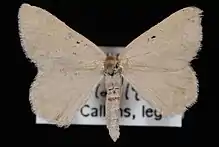Mesothea
Mesothea is a monotypic moth genus in the family Geometridae described by Warren in 1901. Its only species, Mesothea incertata, the day emerald or plain emerald, was first described by Walker in 1863.[1][2][3][4][5] It is found in North America.[2]
| Mesothea | |
|---|---|
 | |
| Mesothea incertata | |
| Scientific classification | |
| Kingdom: | Animalia |
| Phylum: | Arthropoda |
| Class: | Insecta |
| Order: | Lepidoptera |
| Family: | Geometridae |
| Genus: | Mesothea Warren, 1901 |
| Species: | M. incertata |
| Binomial name | |
| Mesothea incertata (Walker, 1863) | |
The MONA or Hodges number for Mesothea incertata is 7085.[6]
Subspecies
It has two subspecies:
- Mesothea incertata incertata (Walker, 1863) i g
- Mesothea incertata viridipennata (Hulst, 1896) i c g
Data sources: i = ITIS,[2] c = Catalogue of Life,[3] g = GBIF,[4] b = Bugguide.net[5]
References
- Savela, Markku. "Mesothea Warren, 1901". Lepidoptera and Some Other Life Forms. Retrieved April 15, 2019.
- "Mesothea incertata Report". Integrated Taxonomic Information System. Retrieved May 2, 2018.
- "Mesothea incertata species details". Catalogue of Life. Retrieved May 2, 2018.
- "Mesothea incertata". GBIF. Retrieved May 2, 2018.
- "Mesothea incertata Species Information". BugGuide. Retrieved May 2, 2018.
- "North American Moth Photographers Group, Mesothea incertata". Retrieved May 2, 2018.
Further reading
- Beadle, David; Leckie, Seabrooke (2012). Peterson Field Guide to Moths of Northeastern North America. Virginia Museum of Natural History. ISBN 0547238487.
- Covell, Charles V. Jr. (2005). A Field Guide to Moths of Eastern North America. Special Publication Number 12. Virginia Museum of Natural History. ISBN 1-884549-21-7.
- Ferguson, Douglas C. (1969). "A revision of the moths of the subfamily Geometrinae of America north of Mexico (Insecta, Lepidoptera)". Bulletin of the Peabody Museum of Natural History, Yale University. 29. ISSN 0079-032X.
- Grote, Aug.R.; Robinson, C.T. (1868). List of the Lepidoptera of North America. American Entomological Society.
- Hausmann, Axel (2001). Hausmann, Axel (ed.). Introduction; Archiearinae, Orthostixinae, Desmobathrinae, Alsophilinae, Geometrinae. The Geometrid Moths of Europe. 1. Apollo Books. ISBN 8788757358.
- Heppner, J.B. (2003). "Lepidoptera of Florida. Part 1. Introduction and catalog" (PDF). Arthropods of Florida and Neighboring Areas. Florida Department of Agriculture and Consumer Services. 17. ISSN 0066-8036. Archived from the original (PDF) on 2018-04-23. Retrieved 2019-04-15.
- Hodges, Ronald W., ed. (1983). Check List of the Lepidoptera of America North of Mexico: Including Greenland. E.W. Classey and The Wedge Entomological Research Foundation. ISBN 9780860960164.
- Pohl, Greg; Patterson, Bob; Pelham, Jonathan (2016). Annotated taxonomic checklist of the Lepidoptera of North America, North of Mexico (Report). doi:10.13140/RG.2.1.2186.3287.
- Powell, Jerry A.; Opler, Paul A. (2009). Moths of Western North America. University of California Press. ISBN 9780520251977.
- Yamamoto, Satoshi; Sota, Teiji (2007). "Phylogeny of the Geometridae and the evolution of winter moths inferred from a simultaneous analysis of mitochondrial and nuclear genes". Molecular Phylogenetics and Evolution. 44: 711–723. ISSN 1055-7903.
This article is issued from Wikipedia. The text is licensed under Creative Commons - Attribution - Sharealike. Additional terms may apply for the media files.